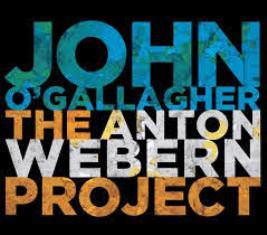
John O’Gallagher
The Anton Webern Project
Whirlwind ****
There’s something about the word ‘project’, isn’t there, that acts like a traffic light in an album title. Usually it’s red for stop. The sometimes wildly atonal aesthetic of Anton Webern (1883-1945) though is green for go as an inspiration on an album that O’Gallagher has long cherished making. The alto saxophonist, who hails from California, and is best known in the UK for his work with Hans Koller and Jeff Williams, first heard Webern’s music when he studied at Berklee college of music in Boston in the late-1980s. And here he has taken eight Webern pieces to base new arrangements on. Joined by vibraphone player Matt Moran, guitarist Pete McCann, Hammond organist/keyboardist Russ Lossing, double bassist Johannes Weidenmuller, drummer Tyshawn Sorey, and singer Margret Grebowicz on the album, it’s a thrilling ride. I guess most jazz fans listening blind wouldn’t realise unless they were told that the new music here is based on Webern compositions (it’s hardly as if ‘Three lieder for voice and piano based on poems by Hildegard Jone’ is as familiar as ‘Round Midnight’) it’s fair to say. Yet it’s surprising how much parallel styles popular at the moment such as M-BASE and “maths jazz” owe to the second Viennese school. In this regard O’Gallagher’s approach here would complete the sentence of a Steve Coleman line without Coleman even having to mouth a syllable. Weidenmuller’s bass contribution on ‘Quartet (after op 22)’ bears comparison to say Anthony Tidd’s work with Coleman even if Tidd is playing electric bass: it’s that kind of sound. The vibes solos propel the band into another space, into the sort of musical situation Dave Holland has pursued at times with Steve Nelson, but the chattering very involving O’Gallagher lead makes the music sufficiently distinctive, and on ‘The Secret Code’ he improvises superbly in one of his best solos of a fascinating and involving album. Grebowicz’s vocals have a stark stillness (for instance at the beginning of ‘Seventh Ring’ that adds a much more direct contemporary classical music inflection) yet very occasionally the album can be seen labouring as a chamber jazz work. Classical music writers might well be a bit sniffy about the temerity of O’Gallagher’s approach with its subtle crypto-funk rhythms and swing proudly on display. But it’s to the saxophonist’s credit that he hasn’t jazzed Webern in a cocktail manner or worse: thrown out all the jazz to please the classical bods, which is usually fatal.
Released on Monday